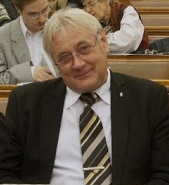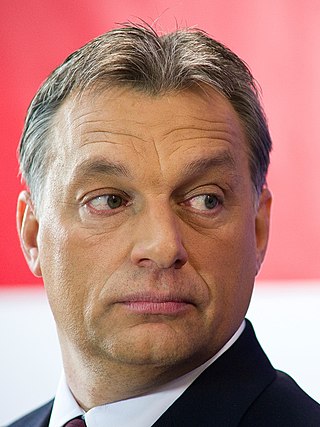
The Hungarian Democratic Forum was a centre-right political party in Hungary. It had a Hungarian nationalist, national-conservative, Christian-democratic ideology. The party was represented continuously in the National Assembly from the restoration of democracy in 1990 until 2010. It was dissolved on 8 April 2011.

Péter Boross is a retired Hungarian politician and former member of the Hungarian Democratic Forum (MDF) who served as Prime Minister of Hungary from December 1993 to July 1994. He assumed the position upon the death of his predecessor, József Antall, and held the office until his right-wing coalition was defeated in election by the Hungarian Socialist Party (MSZP), which was led by his successor Gyula Horn. Prior to his premiership, Boross functioned as Minister of Civilian Intelligence Services (1990) and Minister of the Interior (1990–1993). He was also a Member of Parliament from 1994 to 1998 and from 2006 to 2009.
Elections in Hungary are held at two levels: general elections to elect the members of the National Assembly and local elections to elect local authorities. European Parliament elections are also held every 5 years.

The Christian Democratic People's Party is a right-wing Christian democratic political party in Hungary. It is officially a coalition partner of the ruling party, Fidesz, but is mostly considered a satellite party of Fidesz. The party has been unable to get into the Parliament on its own since the 1990s, as it was not able to pass the election threshold of 5% of the vote. Without Fidesz, its support is now low enough that it can no longer be measured, and even a leading Fidesz politician, János Lázár, stated that Fidesz does not consider the government to be a coalition government.

Katalin Szili is a Hungarian politician and jurist, a former Member of the National Assembly, who served as Speaker of the National Assembly from 2002 to 2009.

Parliamentary elections were held in Hungary on 9 April 2006, with a second round of voting in 110 of the 176 single-member constituencies on 23 April. The Hungarian Socialist Party (MSZP) emerged as the largest party in the National Assembly with 186 of the 386 seats, and continued the coalition government with the Alliance of Free Democrats (SZDSZ). It marked the first time a government had been re-elected since the end of Communist rule. To date, this is the most recent national election in Hungary not won by Fidesz-KDNP, and the last in which the victorious party did not win a two-thirds supermajority in parliament.

Parliamentary elections were held in Hungary on 7 April 2002, with a second round of voting in 131 of the 176 single member constituencies on 21 April. Although Fidesz remained the largest party in the National Assembly despite receiving fewer votes than the Hungarian Socialist Party, the Socialist Party was able to form a coalition government with the Alliance of Free Democrats.

Parliamentary elections were held in Russia on 12 December 1993. They were the first parliamentary elections in post-Soviet Russia and the only time to the Federation Council, with future members appointed by provincial legislatures and governors.

Parliamentary elections were held in Hungary on 25 March 1990, with a second round of voting taking place in all but five single member constituencies on 8 April. They were the first completely free and competitive elections to be held in the country since 1945, and only the second completely free elections with universal suffrage in the country's history. The conservative, nationalist Hungarian Democratic Forum (MDF) beat the liberal and more internationalist Alliance of Free Democrats, which had spearheaded opposition to Communist rule in 1989, to become the largest party in parliament. The Hungarian Socialist Party, the former Communist party, suffered a crushing defeat, winning only 33 seats for fourth place.

Imre András Pozsgay was a Hungarian Communist politician who played a key role in Hungary's transition to democracy after 1988. He served as Minister of Culture (1976–1980), Minister of Education (1980–1982) and Minister of State (1988–1990). He was also a Member of Parliament from 1983 to 1994.

General elections were held in Italy on 27 January 1861, with a second round on 3 February. The newly elected Parliament first convened in Turin on 4 March 1861, where, thirteen days later, it declared the unification of the country as the Kingdom of Italy.
Ferenc Koncz was a Hungarian teacher and politician, member of the National Assembly (MP) for Szerencs from 2010 to 2014, and for Tiszaújváros from 2018 until his death. He was also a Member of Parliament from the Fidesz Borsod-Abaúj-Zemplén County between 1998 and 2002, and from the party's National List from 2004 to 2006. He served as Mayor of Szerencs from 2010 to 2018.
The Independent Hungarian Democratic Party was a political party in Hungary in the period after World War II. The party was revived after the end of communism in 1989–90, but remained unsuccessful.

Mátyás Firtl is a Hungarian engineer and politician, who was elected member of the National Assembly (MP) for Sopron during a by-election in 2005, holding the seat until 2018.

Parliamentary elections were held in Hungary on 6 April 2014. This parliamentary election was the 7th since the 1990 first multi-party election. The result was a victory for the Fidesz–KDNP alliance, preserving its two-thirds majority, with Viktor Orbán remaining Prime Minister. It was the first election under the new Constitution of Hungary which came into force on 1 January 2012. The new electoral law also entered into force that day. For the first time since Hungary's transition to democracy, the election had a single round. The voters elected 199 MPs instead of the previous 386 lawmakers.

Federal elections were held in Switzerland on 27 October 1872. The Radical Left remained the largest group in the National Council.
The Republican Party was a conservative liberal centre party in Hungary.

Parliamentary elections were held in Hungary on 3 April 2022 to elect the National Assembly, coinciding with a referendum. Hungary's incumbent prime minister Viktor Orbán won re-election to a fourth term. Addressing his supporters after the partial results showed Fidesz leading by a wide margin, Orbán said: "We won a victory so big that you can see it from the moon, and you can certainly see it from Brussels." Opposition leader Péter Márki-Zay admitted defeat shortly after Orbán's speech. Reuters described it as a "crushing victory".
United for Hungary was a political alliance in Hungary that was formed to compete in the 2022 parliamentary election. The alliance lost the 2022 election.
The electoral system of Hungary is the set of voting methods and rules used in Hungary, including mainly the system for electing members of the National Assembly : and local government elections. The Hungarian electoral system also includes the systems used for the European Parliament elections held in Hungary and the elections of minority local government elections, as well as the rules of referendums and similar initiatives. The president of the republic is not directly elected.





















